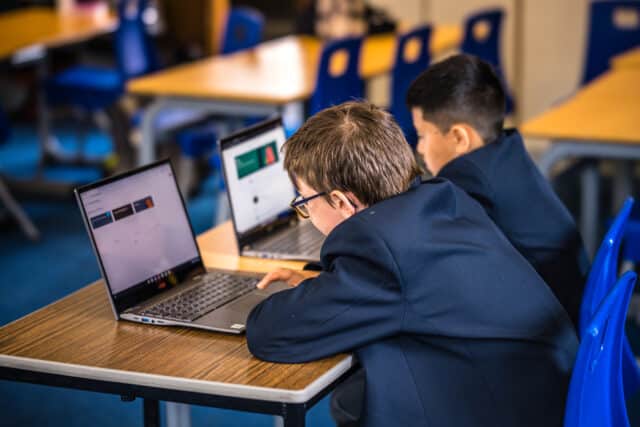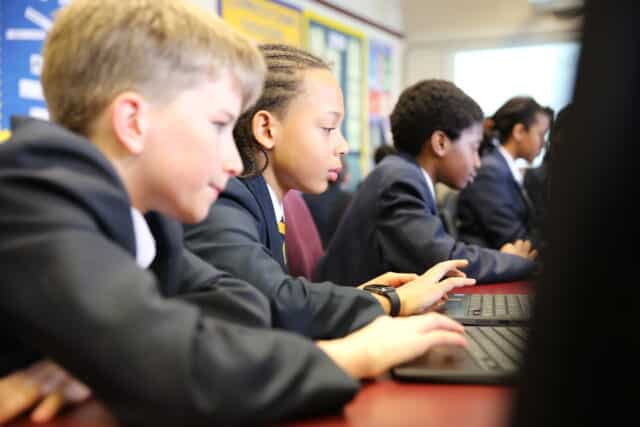Blog
Mindful Clicks: Safeguarding Children’s Minds in the Online World

Mr Francisco Calmaestra
Head of Strategy and Innovation, St Bede’s College
Read the blog
In an age where technology is the cornerstone of our daily lives, children are growing up in a digital landscape that evolves faster than we can keep up. As Head of Innovation at St Bede’s College, I find myself at the forefront of addressing a critical concern: the intricate relationship between internet safety and children’s mental health.
As we delve into this digital frontier, it becomes increasingly evident that safeguarding our children’s minds is not just a matter of limiting screen time but requires a nuanced understanding of the multifaceted impact of the online world.

The Digital Playground: A Double-Edged Sword
The unprecedented advancement of technology that we are witnessing today offers unlimited possibilities but also risks that we need to be aware of. It is neither intrinsically good nor bad, it is simply a medium to make use of and therein lies the crux of the matter in acquiring the knowledge, skills and strategies to make the impact of the digital world on our lives a positive one.
As educators and parents, we must recognise the undeniable benefits of technology in fostering creativity, critical thinking and global awareness. However, we can no longer turn a blind eye to potential dangers such as cyberbullying, exposure to inappropriate content and nomophobia.
The latter phenomenon is especially prevalent in pre-teens and teenagers who are highly dependent on their devices. Linked to this reality is a worrying deterioration in the mental health of young people. In this sense, it is necessary to understand in depth how technology affects the functioning of our brains and emotions. For this reason, at St Bede’s we offer different training activities regularly, such as the conference “Understanding Anxiety” with psychotherapist Sarie Taylor.
Guardians of the Virtual Realm: The Role of Schools and Parents
The responsibility for guiding our children through the digital landscape goes beyond the walls of the classroom. Schools and parents must work together to establish a comprehensive framework for online safety. In this sense, technology can help to delimit spaces and rules for internet access through different apps such as Google Family Link and Family Sharing, tools similar to the ones we use in class and that we recommend to parents, especially for younger children.
However, to fully empower children to navigate it responsibly and safely is necessary to go beyond restrictive measures and embrace education. By fostering an understanding of the potential risks and teaching responsible online behaviour, we equip our students with the tools needed to thrive in the digital age. Moreover, open communication channels between educators, parents, and students are essential to creating a supportive environment where concerns can be addressed and solutions explored collaboratively.

The Mental Health Quotient: Balancing Screen Time with Well-being
The digital revolution has redefined how children interact with the world, blurring the lines between the virtual and the real. Therefore striking a balance between harnessing the benefits of technology and safeguarding mental health requires a holistic approach.
Encouraging outdoor activities, promoting face-to-face social interactions and establishing technology-free zones at home are simple but effective strategies. Along these lines, at St. Bede’s we proposed a small DIY, a mobile phone parking that proved to be a great help in keeping spaces reserved for interaction and socializing, such as the dinner table, free of devices. As educators, we must also be vigilant in identifying the signs of digital fatigue among our students and intervene when necessary, ensuring that their mental health remains a top priority.
Charting the Course Ahead
In navigating the digital frontier, the onus is on us – educators, parents, and guardians – to be proactive stewards of our children’s online experiences. Internet safety is not a passive endeavour but an evolving dialogue that requires continuous adaptation to the ever-changing digital landscape.
As we chart the way forward, let us foster a generation that is not only digitally literate but also resilient in the face of online challenges. By instilling the values of empathy, critical thinking and responsible digital citizenship, we can empower our children to thrive in the digital age while preserving their mental health and well-being.


